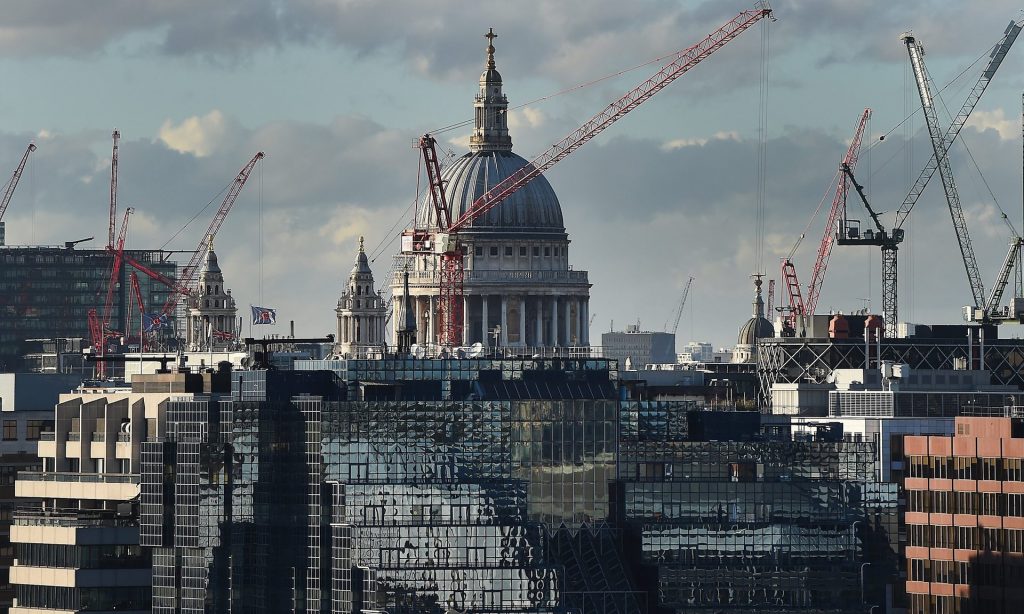Britain’s vote to leave the EU has sent further shock waves through financial markets, with three more property funds suspended, the pound plunging and share prices falling amid fresh uncertainty about the economic impact of the decision to leave the EU.
Funds responsible for investing some £14bn in shopping centres, office blocks and warehouses have now locked out investors following the decision by Henderson, Threedneedle Columbia and Canada Life to suspend dealing on Wednesday after being swamped by investors attempting to redeem their cash.
The three made their announcements after Standard Life, Aviva and Prudential’s M&G barred investors from withdrawing their cash earlier in the week. The suspensions mean that half of all UK retail property funds are suspended, according to calculations by Hargreaves Lansdown, and there were expectations that more would follow.
Another fund Aberdeen Asset Management said it was reducing the
dealing price by 17% and would be suspended until Thursday.
The pressure on the commercial property sector – which had enjoyed a 40% rise in prices from 2009 until the start of this year – came after the pound hit fresh 31-year lows, and shares in London also fell.
The pound fell as low as $1.2796 – a level last seen in June 1985 – at one point on Wednesday and is still well below the $1.50 sterling had reached immediately after the polls closed on 23 June. Analysts said it could fall to $1.20 amid warnings of a slowdown in UK growth and the prospect of a cut in UK interest rates as soon as next week.
“The pound seems particularly sensitive to news from the UK construction sector, which is being seen as a bellwether for Brexit concerns in general,” said Julian Jessop, chief global economist at Capital Economics.
The FTSE 100 index – which has rallied over the past week on the back of the falling pound – sunk back by just over 1% to close at 6463.6 as fears of a price war sent shares in supermarkets lower. Banks, insurers and property companies were also down. Royal Bank of Scotland and Lloyds Banking Group were among the biggest fallers and identified by analysts as the major banks having the greatest exposure to the property sector.
While the blue chip index remains above its pre-Brexit vote levels, the FTSE 250 index of mid-sized companies – regarded as more closely tied to the UK economy as it contains fewer businesses that trade internationally – is down 10% since the referendum result, after falling another 0.4% to 15669 on Wednesday.
In a race for perceived safe havens, investors have turned to government bonds, pushing down yields. The yield on a 10-year German government bond fell to a new low of minus 0.20%.
An analyst at Bernstein said RBS and Lloyds had £19bn and £13bn of commercial property loans respectively. Shares in RBS have fallen to levels they traded at in 2009, pushing back the point at which the government can sell its 73% stake at a profit. Lloyds is also trading well below the level at which the government can profit by selling its 9% holding.
Raul Sinha, an analyst at JP Morgan, said: “While the major UK banks have £69bn of exposure we highlight smaller banks and building societies have exposure of £17bn but at higher loan-to-values.” Commercial property lending by banks is down from £150bn in 2011 with foreign investors now accounting for 40% of the funding for the sector.
With the focus on the property funds, Laith Khalaf, senior analyst at Hargreaves Lansdown, said investors should not make decisions in a panic. “Over half of the property fund sector is now on ice, and will remain so until managers raise enough cash to meet redemptions. To do that they need to sell properties, and as any homeowner knows, that is not a quick or painless procedure”.
Shaun Port of the online investment company Nutmeg said: “We think all of these funds will now [close], probably for the remainder of the year. Investors tend to invest on the understanding that they can sell their investment at any time, but the underlying assets – large buildings – are themselves very hard to sell at short notice.”
However, amid all the gloom the UK’s trade minister said Brexit could lead to a “second golden age of trade and investment”. Speaking on his first foreign visit since the referendum, Mark Price, said that Britain could now free itself from EU’s “bureaucratic tendencies” and that a fall in the value of sterling will help exporters and attract new investment.
Lord Price, the former boss of Waitrose, said: “The key message here is that we have a strong economy, we remain a fantastic place to invest, and have plenty of innovative, successful businesses. I have every confidence we will make this work.”
However, uncertainty surrounding the EU referendum was blamed for the fall in the latest business barometer from Lloyds Bank, which showed a collapse in confidence across most sectors of the economy.
Conducted in the week after the EU referendum, the bank’s confidence index tumbled 26 points to 6% in June, leaving it at the lowest level since 2012, when the euro sovereign debt crisis was in full swing.

